Related Research Articles
Discovered in the 1990s, the earliest human remains in the Democratic Republic of the Congo have been dated to approximately 90,000 years ago. The first real states, such as the Kongo, the Lunda, the Luba and Kuba, appeared south of the equatorial forest on the savannah from the 14th century onwards.

Rwanda, officially the Republic of Rwanda, is a landlocked country in the Great Rift Valley, where the African Great Lakes region and East Africa converge. One of the smallest countries on the African mainland, its capital city is Kigali. Located a few degrees south of the Equator, Rwanda is bordered by Uganda, Tanzania, Burundi, and the Democratic Republic of the Congo. It is highly elevated, giving it the soubriquet "land of thousand hills", with its geography dominated by mountains in the west and savanna to the east, with numerous lakes throughout the country. The climate is temperate to subtropical, with two rainy seasons and two dry seasons each year. Rwanda has a population of over 12.6 million living on 26,338 km2 of land, and is the most densely populated mainland African country.
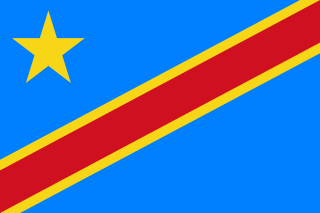
The Democratic Republic of the Congo (DRC), also known as Congo-Kinshasa, DR Congo, the DROC, or simply either Congo or the Congo, and historically Zaire, is a country in Central Africa. It is, by area, the largest country in sub-Saharan Africa, the second-largest in all of Africa, and the 11th-largest in the world. With a population of around 103 million, the Democratic Republic of the Congo is the most-populous officially Francophone country in the world, as well as the 2nd-most populous country in Africa, and the 13th-most populous country in the world. Since 2015, the Eastern DR Congo has been the scene of an ongoing military conflict in Kivu.

Coltan is a dull black metallic ore from which are extracted the elements niobium and tantalum. The niobium-dominant mineral in coltan is columbite, and the tantalum-dominant mineral is the tantalite.

Paul Kagame is a Rwandan politician and former military leader. He is the 6th and current president of Rwanda, having taken office in 2000 when his predecessor, Pasteur Bizimungu, was dismissed and arrested. Kagame previously commanded the Rwandan Patriotic Front, the Uganda-based rebel force that invaded Rwanda and was one of the parties of the conflict during the Rwandan genocide. He was considered Rwanda's de facto leader when he served as Vice President and Minister of Defence from 1994 to 2000. He was re-elected in August 2017 with an official result of nearly 99% in an election criticized for numerous irregularities. He has been described as the "most impressive" and "among the most repressive" African leaders.

South Kivu is one of 26 provinces of the Democratic Republic of the Congo. Its capital is Bukavu.

The Interahamwe is a Hutu paramilitary organization active in the Democratic Republic of the Congo and Uganda.
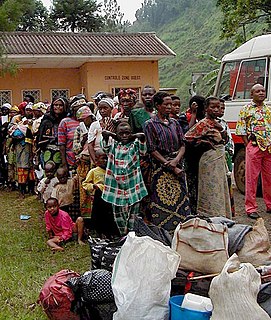
The Second Congo War began in the Democratic Republic of the Congo in August 1998, little more than a year after the First Congo War, and involved some of the same issues. The war officially ended in July 2003, when the Transitional Government of the Democratic Republic of the Congo took power. Although a peace agreement was signed in 2002, violence has continued in many regions of the country, especially in the east. Hostilities have continued since the ongoing Lord's Resistance Army insurgency, and the Kivu and Ituri conflicts.

The Rwanda Defence Force is the national army of Rwanda. The country's armed forces were originally known as the Rwandan Armed Forces (FAR), but following the stopping of the 1994 Genocide against Tutsis, the victorious Rwandan Patriotic Front (Inkotanyi) created a new organization and named it Rwandan Patriotic Army (RPA). Later, it was renamed to its current name.
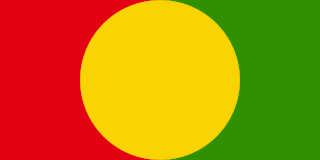
The Democratic Forces for the Liberation of Rwanda is an armed rebel group active in the eastern Democratic Republic of the Congo. An ethnic Hutu group opposed to the ethnic Tutsi influence, the FDLR is one of the last factions of Rwandan rebels active in the Congo. It was founded through an amalgamation of other groups of Rwandan refugees in September 2000, including the former Army for the Liberation of Rwanda (ALiR), under the leadership of Paul Rwarakabije. It was active during the latter phases of the Second Congo War and the subsequent insurgencies in Kivu.
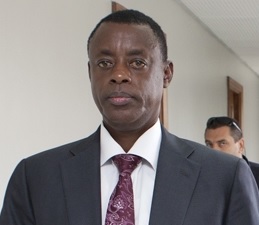
James Kabarebe is a Rwandan military officer who has served as a Senior Presidential Adviser on security matters in the government of Rwanda, since 19 October 2018.

The mining industry of the Democratic Republic of the Congo is a significant factor in the world's production of cobalt, copper, diamond, tantalum, tin, and gold. It is the Democratic Republic of the Congo's largest source of export income. In 2009, the Democratic Republic of the Congo (DRC) had an estimated $24 trillion in untapped mineral deposits, including the world's largest reserves of coltan and significant quantities of the world's cobalt. The United States Geological Survey estimates that the DRC has 1 million tons of lithium resources.
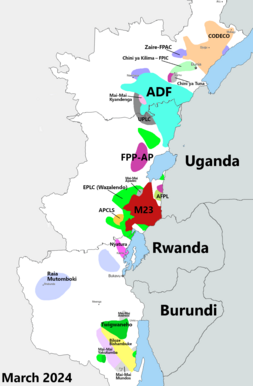
The Kivu conflict began in 2004 in the eastern Congo as an armed conflict between the military of the Democratic Republic of the Congo (FARDC) and the Hutu Power group Democratic Forces for the Liberation of Rwanda (FDLR) in the Democratic Republic of the Congo. It has broadly consisted of three phases, the third of which is an ongoing conflict. Prior to March 2009, the main combatant group against the FARDC was the National Congress for the Defence of the People (CNDP). Following the cessation of hostilities between these two forces, rebel Tutsi forces, formerly under the command of Laurent Nkunda, became the dominant opposition to the government forces.

Human rights in Rwanda have been violated on a grand scale. The greatest violation is the Rwandan genocide of Tutsi in 1994. The post-genocide government is also responsible for grave violations of human rights.
Laurent Nkunda is a former General in the Armed Forces of the Democratic Republic of Congo (DRC) and is the former warlord operating in the province of Nord-Kivu, sympathetic to Congolese Tutsis and the Tutsi-dominated government of neighbouring Rwanda. Nkunda, who is himself a Congolese Tutsi, commanded the former DRC troops of the 81st and 83rd Brigades of the DRC Army. He speaks English, French, Swahili, Kinyarwanda, Lingala and Kinande. On January 22, 2009, he was put under house arrest in Gisenyi when he was called for a meeting to plan a joint operation between the Congolese and Rwandan militaries.

The Democratic Republic of the Congo, and the east of the country in particular, has been described as the "Rape Capital of the World," and the prevalence and intensity of all forms of sexual violence has been described as the worst in the world. Human Rights Watch defines sexual violence as "an act of a sexual nature by force, or by threat of force or coercion," and rape as "a form of sexual violence during which the body of a person is invaded, resulting in penetration, however slight, of any part of the body of the victim, with a sexual organ, or of the anal or genital opening of the victim with any object or other part of the body."

Its location in the center of Africa has made the Democratic Republic of the Congo a key player in the region since independence. Because of its size, mineral wealth, and strategic location, Zaire was able to capitalize on Cold War tensions to garner support from the West. In the early 1990s, however, with the end of the Cold War and in the face of growing evidence of human rights abuses, Western support waned as pressure for internal reform increased.
Sylvestre Mudacumura was the overall commander of the military wing of the rebel Democratic Forces for the Liberation of Rwanda (FDLR), known as the Forces Combattants Abacunguzi (FOCA).
General John Numbi is a Congolese military officer. Until January 2010, he was the Inspector General of the Congolese National Police. In 2018 he was appointed as the Inspector General of the Armed Forces of the Democratic Republic of the Congo (FARDC).
The Democratic Republic of the Congo (DRC) is a source and destination country for men, women, and children subjected to trafficking in persons, specifically conditions of forced labor and forced prostitution. The majority of this trafficking is internal, and much of it is perpetrated by armed groups and government forces outside government control within the DRC's unstable eastern provinces.
References
- ↑ "Kibua". viamichelin.com. Retrieved 21 February 2017.
- ↑ Biebuyck, Daniel P. (1966). Rights in land and its resources among the Nyanga (Republic Congo-Léopoldville). Académie royale des sciences d'outre-mer. p. 34.
- ↑ Moore, Jina (February 20, 2009). "Hutu rebels drop guns, return to Rwanda". The Christian Science Monitor. Retrieved 21 February 2017.
- ↑ Gettleman, Jeffrey (3 October 2010). "Mass Rapes in Congo Reveals U.N. Weakness". The New York Times . Retrieved 20 February 2017.
The Indian peacekeepers at the base nearest Luvungi, in Kibua...
| This North Kivu Province location article is a stub. You can help Wikipedia by expanding it. |